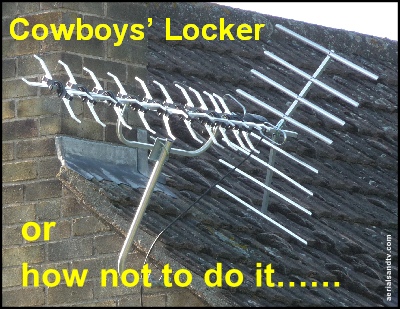Pondering....
Subject list :
- Our Forth Bridge Philosophy
- Thick n' Thin (brackets)
- Choosing An Aerial Installer
- - incl How much should I pay for an aerial install?
- 4" Fence Posts (and the meaning of life)
- No one has ever complained before...
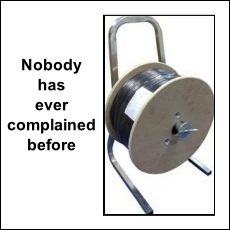
Our Forth Bridge philosophy
The Forth rail bridge of 1890 is one of my favourite structures. One of the reasons for this is that it was massively over engineered, due to the tragic collapse of the Tay bridge some years before in 1879.
"What has this got to do with aerial sales ?"
Well I think it goes some way to explain why we only sell QUALITY stock. I love well engineered products (the Yagi 18s being one of the best examples, OK after a 110mph wind !) and I can't stand cheap rubbish, particularly when any price difference is so small compared with the cost of the average TV.
Also see 4” Fence Posts (and the meaning of life)....

There's one other thing that this business has in common with the Forth bridge. Painting the latter* is reputed to be a never ending job (this is no longer the case but why spoil a good anecdote), and as my wife pointed out, this website is never finished either.....
* The huge 10 year job of repainting the bridge with 240 000 litres of "high tech" epoxy glass paint was finally completed in December 2011. The paint is reputed to last 20 years, so simple subtraction hints at the fact the job won't require starting again for about 10 years....
Thick n' Thin (or, a bracket isn't just a bracket)
These two bracket sections are ostensibly the same but the one on the left has metal 3.2mm thick (average) whereas the one on the right is only 2.7mm. We sell the product on the left, also see bracket tests.
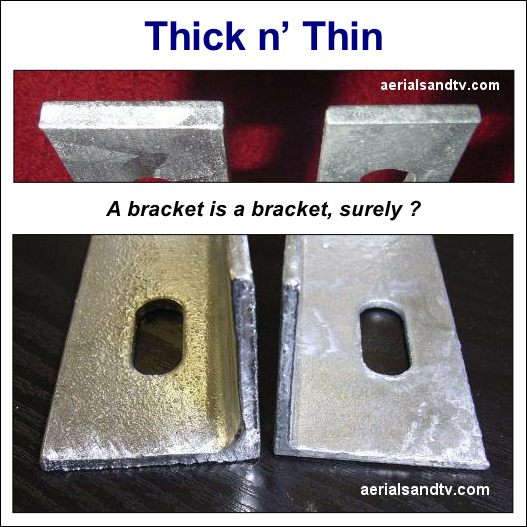
Choosing An Aerial Installer (and tradesman generally.....)
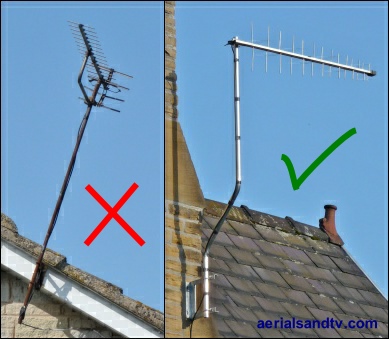
I've got to say I don't particularly like dealing with tradesmen. Apart from concern whether they actually do a good job, or overcharge you, the most annoying thing is that most of them never seem that bothered whether they get the business or not, builders and plumbers being the worst offenders in that regard I think. In fact many of the jobs I do round my own house I would actually get someone in to do if I could be sure they'd turn up when they say they will, do a good job, for a fair price, reasonably quickly, and (even moderately) enthusiastically ! You know what I mean...... If you know any who fulfil the above criteria, stick with them, and, if they're in the Sheffield area, please give me their phone numbers !
We regularly get people phoning us from all over the country wanting us to undertake an aerial installation for them but, unfortunately, our installer only works work in the vicinity of Sheffield, though he can go a bit further for an extra charge !
The next question is can we recommend anyone, and again the answer is no, but here is some guidance in how to find an installer locally.
Does your prospective installer use steel (or 1" alloy) poles and/or Contract aerials and/or painted brackets ? That's always a bad sign because it proves they're using the cheapest possible materials. On a positive note if they use decent quality aerials (not Bacofoils though....) that's a good sign, as is use of copper/copper satellite cable. There's not that many installers (5% ? ) who use the latter because it's quite expensive, so if the installer you're considering does use it that's a very good indication they do a professional job.
Don't forget to use the information on this website to check up on the installer (and the job), but don't go on at them too long (or make it too obvious) because that'll just annoy them !
See Cowboys' Locker
or
how not to do it..
Obviously the best way to find any tradesman is by personal recommendation but this is not cast iron as aerial jobs can be so different. The recommended installer could have done a job for someone who lives in a strong signal area, were anyone with half a brain would get "perfect pictures", even by indulging in some Bertie Bodging. I have to say, and I speak from experience, personal recommendation doesn't always work anyway. A tradesman was glowingly recommended to me by a neighbour, his job was cheap but it was a bit of a bodge and it was difficult getting him back to rectify a problem. And he wanted paying cash, I didn't oblige (I never pay tradesmen in cash), but it was a bit of an awkward situation.
The Confederation of Aerial Installers is a good place to start, theoretically you've got some redress if the job is unsatisfactory, but to be honest, although most are fine, not all CAI members are people that I`d recommend.......
I find that Church / Parish magazines are a good source of tradesman, not least because the Vicar may well remove adverts from traders that have been the subject of complaints!
Getting someone out of the Yellow Pages (or some other printed directory) is preferable to just an advert in the paper, at least they exist as a company, and have managed to survive since it was published. On that point, an old edition directory is preferable,so remember to keep one of them ! When using the phone directories there are a few things to watch for :
1 - Try and use someone with a local telephone number and preferably not just a mobile as the latter can be ignored if they don`t want to talk to you, and they`re more expensive obviously ! Avoid Freephone numbers, apart from being "non local" my experience is that companies using them are often more expensive in the end. On the subject of Freephone numbers many of them (though not all) go to a central agency which then gives the job out to another company for a commission. I've got to tell you this fabulous story I heard from one of our customers. He phoned an 0800 number and two installers turned up within 5 minutes of each other, and then started arguing as to who should do the job ! I'm sure that`s a rare occurrence, but even so, how fantastic is that !
2 - It's definitely a good idea to use someone with (local) business premises, if you can, because it's so much easier to get hold of them, they can't just ignore you if you have a problem. Alternatively make sure the installer put's their address on the advert / site, and make sure it's a genuine one, not just a misleading "geographical reference point". Beware of Nationwide companies who are not local to you (they often just sub contract the work out) and many use multiple company names all going to the same call centre.
3 - Ironically "free surveys" are not necessarily a positive. Generally speaking people cannot survive by working for nothing ( ! ? ! ) so the temptation may well be to recommend work which is not actually required. For example, if it's simply a case of telling you that you can already get digital with your present aerial the installer who charges a call out should be (relatively) happy to tell you this and leave. One doing a “free call out” will obviously be more tempted to recommend an "aerial upgrade".....
4 - Try to get a few quotes over the phone but remember they can only be ball park figures. Avoid the temptation to go for the cheapest, unless you know for a fact that they're reputable and they do a good quality job.
Always get an (itemised) invoice, and don't pay up until you get one.
Any business failing to leave a bill is thoroughly unprofessional, and possibly dishonest.
If you get one of the “cash in hand” brigade giving you a poor service, I'm sure that the Inland Revenue would be interested to hear their activities.
That way they might even start paying their fair share for the NHS, like the rest of us do.....
Incidentally if you purchase any parts from us and subsequently decide to employ an installer to fit them, any decent rigger should be impressed by the quality of the materials you have bought. If they try to tell you they are unsuitable in anyway you may have well have picked the wrong installer, he knows less about aerials than he does about trying to sell you his stuff…..[link] That said you may have struck lucky and chosen the right installer who might be giving you a pleasant surprise that there's nothing wrong with your system and it's just your TV is tuned to the wrong transmitter, or you've got too much signal and all you need is an attenuator (or to bypass your amplifier). Alternatively he may tell you that you just need your cable changing. So check all these things first before getting an aerial installer in (or ordering a load of stuff from us ! )…….
Anyway, if you get some tradesman johnny trying to pull the wool over your eyes you phone us up and put the guy onto me (Justin Smith) or my staff and we'll put them right there and then.
How much should I pay for an aerial installation ?
These approximate prices are for outside installs, those in the loft should be cheaper, though to be frank, if your aerial is going in the loft why not do it yourself ? See Loft aerials
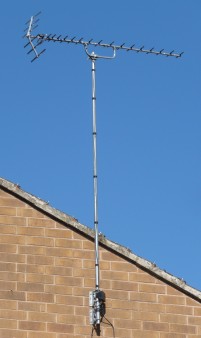
Well this is actually quite a big question. I'm told that "darn London mate" things are more expensive, though I can't really see why it should be that much more to fit an aerial. Maybe the installers think they should be earning as much as "them in the City" ?
On the other hand I sometimes hear unbelievably low quotes as well, though I find it hard to believe they're for a complete aerial installation using quality components. You must remember that the best quality cable, brackets, poles & aerials, cost 2 or 3 times as much as the cheapest.
There may, quite reasonably, be extra charges if the installer has to drive some distance to site, or he has to come back because he can't do the job for some reason,e.g. your rose bush is right in the way of where he needs to put his ladders. Bear in mind that aerial installers haven't got flying carpets, for example, how are they supposed to get to a wall above a conservatory (to either mount the aerial or run a cable) ?
Most aerial installers don't like working inside (cable runs etc) because that's a classic area for problems as to what "looks nice", or is even possible at all. Nearly all aerials or extensions will be to an outside wall, if you want it to an inside wall I'd install that bit of cabling yourself for the installer to join onto.
Anyway, for a decent quality aerial installation (everything new, including decent cable), on a standard size two storey house, to one point [no wall plate], I'd have thought around £130 would be fair, possibly a bit more for an install on a chimney. If an amplifier is required that'd put the price up by £20 to £30, and awkward cable runs and/or access problems would also be more. Nightmare jobs (requiring time consuming aerial positioning tests etc) would, rightly, put up the price, maybe by a considerable amount depending how long it takes, though the installer should keep you aware of any potential increase in costs if he hits problems. This is why there are certain circumstances where an informed DIYer may actually stand a better chance of getting reasonable reception.
Getting an aerial installer out to an aerial repair is usually a false economy because, if you think about it, the installer coming round to your house and getting on your roof is half the job ! In fact a repair is usually more then half the price of a complete replacement.
The price of an aerial extension from your existing aerial (not to a wall plate) would usually be £50 to £60, a bit more if an awkward cable run or an amp is required. Extra aerial points put in at the same time as an aerial installation would usually be a bit cheaper because the installer is already on site with all his ladders and tools out.
Site surveys / set ups / retunes £30 to £40, assuming they can be done in under half an hour and the installer hasn't had to come too far. Setting up one TV would normally be included in the price of an aerial installation (or each aerial extension), but if the installer changes the aerial on a distribution system it's not reasonable to expect him to retune every single TV [connected to that aerial] for no extra money !
Lastly, you`ll always get better service from an aerial installer if you have the job done in the summer, usually April to September. Not only will the better weather mean he's likely to be in a better mood ( ! ) but he's likely to have less work on as well. When we used to mend TVs it was the same, it was always slacker in the summer. The theory is the better weather and longer nights mean people watch less TV and so are less bothered about a crap picture !
On the other hand the worst time to get aerial work done is in November/December when demand is at peak levels, the days are shorter (less time to do the installation jobs) and the weather is usually crap. Thus there may be delays getting the job done and the installer is bleedin' freezing so not quite as friendly and accommodating as he might otherwise be, so think on !
4" fence posts (and the meaning of life)
I know what you're thinking, “Good Lord, what a website this is, it even tells you about fence posts, it'll be revealing the meaning of life next”. The answer to the latter is effort by the way but back to fence posts. I would only ever use 3 inch fence posts for a small fence in a sheltered area, what you should be using are the 4 inch variety. Partly because one should always do a Quality Job (and have some pride in it.....), but also because its usually cheaper in the long run anyway.
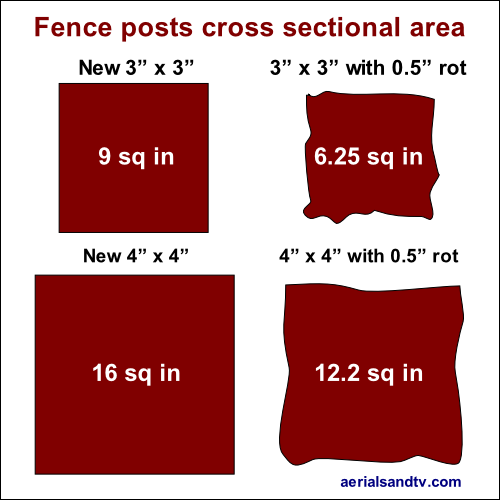
When my fence got blown down a few years back I did my usual trick and thought about it far too much. The fence was the usual 6ft square panel type and the posts were the common 3” x 3” variety. A bit of rot had set in over the years so they were probably down to about 2.5” square at the base, which is just the point that is put under the most strain.......
Now the strength of a post is down to its cross sectional area, that is to say a 3” variety would be 3 x 3 = 9 square inches. Add in half an inch of rot to the equation and we get about 2.5 x 2.5 = approx 6 sq in. Compare that to a 4 inch fence post which is 4 x 4 = 16 sq ins, or about 12 sq ins if some rot has weakened it.
The point of all of this is that a 4” post is not just 33% stronger than a 3” one, it's nearly twice as strong. In fact if you add in half an inch of rot, it actually has got twice the strength. The price difference on the job, whether you DIY or GSI* is not worth bothering with, and you get a fence which is TWICE as strong.
You know it makes sense, just like our 1.25” x 16 gauge aerial poles !.
* Do It Yourself / Get Someone In
Also see Poles tests
Nobody has ever complained before
Let me tell you the best example of this fatuous answer, which is also relevant for an aerial website. We use cable reel holders both on site and in the shop because they make dispensing cable much easier. A few years ago we bought two because a couple of ours were knackered. When they got here we noticed they had a bearing on the centre spindle, and I can remember us playing with them, spinning the spindle round and thinking, “Ohh that's posh, what a good idea, quality stuff ! “. We were like kids in a sweet shop, keen to play with our new toy.
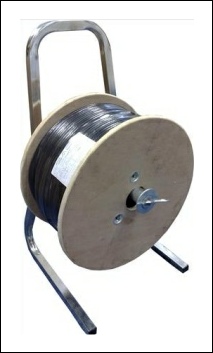
On the first job the installer pulled off the relevant amount of cable with a warm glow inside as he watched the quality reel holder smoothly rotating and dispensing the cable. When he'd pulled off the right length he went off to get his snips, but when he returned the cable reel holder was still smoothly rotating on its posh spindle and had spooled half a drum of cable all over the ground.....
The two installers looked at each other, then at all the cable on the floor, then back at each other, and said (in unison),
“What an absolutely S**T idea that is..........”
It's actually an even worse idea because not only does the bearing make the product a pain in the arse to use but it also makes the holder more expensive to manufacture and makes it weaker, which we discovered when one of the spindles snapped off.
We'd had enough by then and welded the spindles straight onto the frame......
I was so offended by this appalling piece of design that I took the trouble to phone the manufacturer about it.
Their response ?
Yes, you`ve got it, that immortal phrase, “no one has ever complained before (so it's fine)”.
So let's get this right, no one has ever complained about a product which, when you think about it, is patently useless in every possible way.
Thus proving that most people really can't be bothered to complain, and, more importantly, just because no one has ever complained before, that definitely, definitely, does not mean that there isn't a problem........
As a general principle there's nothing wrong with complaining, particularly if your complaint is constructive. Well run companies are only too pleased when customers point out to them where they're going wrong, or better still, how they could do it better. In fact Albert Speer * was quoted as saying that complaining is a valuable process for encouraging efficiency and the fact so few people complained in Nazi Germany was a weakness as compared to the democracies.
Apparently you never heard :

Dear Mr Hitler,
I wish to register a complaint.
Every time your Gestapo lads walk up our road their dogs crap on the pavement.
Best Regards
A Concerned Resident.
(PS Please don't send me to a concentration camp)
Anyway Albert Speer went further and bemoaned the fact that complaints from the top of an organisation downwards are common, but equally valuable is the rather less frequently heard criticism from the bottom upwards......
Don't get me wrong, complaints/suggestions aren't always correct or justified, but they usually are.
I can tell you for a fact that much of our customer feedback has directly resulted in changes to the way we operate, e.g. when a customer wanted to transport his aerial in its box across to Ireland on the ferry we put a table of box sizes on our site. Another guy mentioned we should have a search facility on the site (we didn't at that time), so we thought about it and got one on.
Quite apart from anything else I'm of the view that if one customer takes the time to complain or suggest something there's every chance that many others feel the same way but can't be arsed to bother, and one can't blame them for that, most people have busy lives these days. For instance, have you ever sat on a train felt a bit cramped and thought I'm sure there used to be more room than this ! Well you`re right, the cheeky gits are squeezing more seats into the same length train carriage. Now I can't believe I'm the only person who has felt a bit short of legroom on some of the trains these days but, apparently, hardly anyone has ever complained about it. Result ? They get away with it.
Let the train companies, and, in fact, all companies, know what you think.
They do actually want to know anyway !
If they've got decent managers anyway......
* Albert Speer's autobiography “Inside the Third Reich”, pages 265 and 297.


